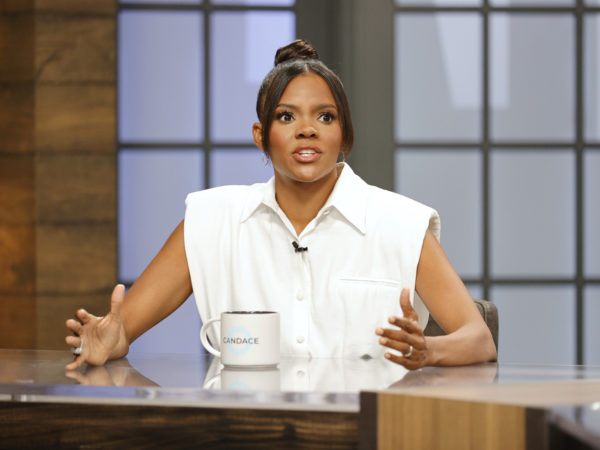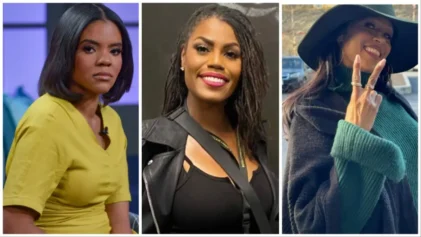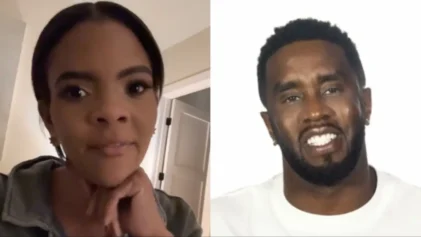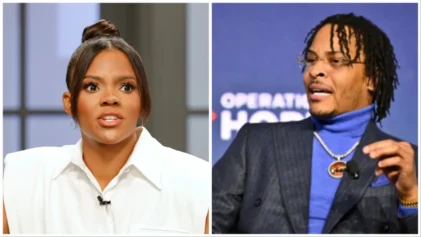Right-wing talking head Candace Owens called out Black celebrities who are vocal about social issues impacting African-Americans but don’t live in predominantly Black neighborhoods.
Owens made the comments last week during an episode of her YouTube podcast in which she supported “Dilbert” creator Scott Adams’ warning to white people to stay away from African-Americans. Adams made the declaration in response to a Rasmussen poll that showed a slight majority of Black people surveyed disagreed with the statement that “it is OK to be white.”

“Considering every time a Black person gets any money, they don’t choose to live in Black neighborhoods even though they can certainly afford to,” Owens said. “Looking at you, LeBron James. Looking at you, Patrisse Cullors. Looking at you, Gabrielle Union and Dwyane Wade…”
Scott walked back the comments on “NewNation” with Chris Cuomo Tuesday, saying his remarks were just hyperbole to evoke discussion and lead to solutions. However, Owens and other conservatives replayed Adams’ monologue to propel their own agendas targeting Black America.
In the not-so-factual video, Owens ripped apart the Black Lives Matter movement, claiming it encouraged Black people to hate whites. She blamed the school system and academia for promoting anti-white rhetoric through critical race theory and mainstream media for content pushing racism against white people.
“So what are white people supposed to do with the predicament?” She asked.
The conservative provocateur concluded that the divisive attitudes and rising crime in Black neighborhoods ultimately lead to self-segregation, but she also questioned why successful African-Americans shied away and haven’t offered any fixes.
“None of these people are living in Black neighborhoods. They’re living in white neighborhoods far away from the drama they love to comment on,” she said. “Why didn’t LeBron James take his many millions and build a giant home in the middle of the South side of Chicago?”
Owens went on blame Black Americans’ dependency on government support for an alleged inclination of poverty among the race since the Jim Crow Era.
According to US Treasury data, the poverty rate among Black Americans has declined since 1959, but the wealth gap has widened between white and Blacks.
“There aren’t enough wealthy black people to create a thriving upper class across all of America. Unless you expect all wealthy African Americans to live in one city or state and that is just not practical,” wrote one viewer. “If there is poor policing and bad schools in poor black neighborhoods why wouldn’t anyone leave the first chance they get for the benefit of their families.”
Although Owens purports that Black Americans attribute the economic gap to the “Racism Boogeyman,” history has shown records of the U.S. government using eminent domain and other policies to strip Black people of their land.
Black neighborhoods like Treme in New Orleans, Overtown in Miami, and Brooklyn in Charlotte were divided for highways. Other neighborhoods throughout the nation were demolished through “urban renewal.” Some were thriving communities before being targeted for other use.
Amid the comments from Owens’ base supporting her monologue, one viewer reminded the commentator of the Tusla Race Massacre, which wiped out one of the wealthiest Black neighborhoods in the country. It is one of more than half a dozen well-known instances where white mobs wreak havoc on Black communities.
Still, some viewers pointed out that the issue is not just about race but a separation of classes.
“If a predominantly black area had the cleanest streets, the lowest crime and a high degree of safety, other kinds of people would wanna live there,” another viewer wrote. “Safety and cleanliness alone will increase the property value of an area without improving much else.”
While their reasons vary, many echoed Owens’ unintended message of Black unification.
“If wealthy Black individuals were to live in predominantly Black neighborhoods, it could have a tremendously positive impact on the community,” one viewer wrote.


